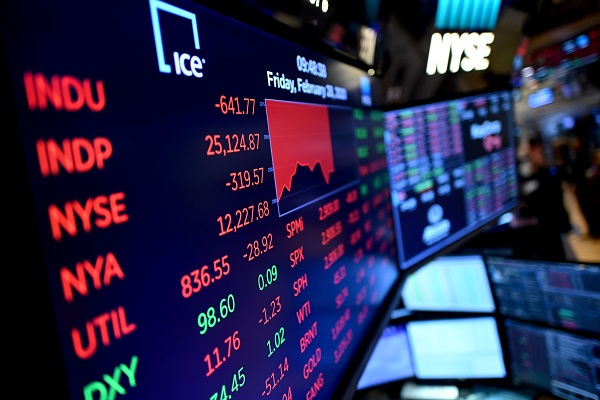Market snapshot: sowing some seeds of doubt
Data dominates proceedings at the moment both here and in the US. ii's head of markets rounds up the action and which stocks are doing well on Friday.
13th December 2024 08:36
by Richard Hunter from interactive investor

A warmer than expected inflation reading sowed some seeds of doubt on the likelihood of a Federal Reserve interest rate cut next week.
The razzmatazz of Wall Street being opened by the President elect soon faded as investors focused on the thorny issue of inflation once more.
- Invest with ii: What is a Managed ISA? | Open a Managed ISA | Transfer an ISA
The Producer Price Index, which tracks wholesale prices, rose by 0.4% in November against expectations for a rise of just 0.2%. Treasury yields jumped as a result, and the main indices drifted lower in the face of the new news. While the Consumer Price Index had come in line with estimates the previous day, and is seen as the Fed’s preferred measure of inflation, the so-called “final mile” towards the Fed’s 2% inflation target has been the hardest with sticky prices still being experienced more broadly.
The consensus is still overwhelmingly forecasting a rate cut next week, even though the latest data casts some doubt as to whether the Fed will err on the side of caution and decide to pause for this month. In any event, the pace of rate cuts during next year has already been dialled back significantly by investors, given that the economy may have to contend with the likely inflationary impacts of measures which the new President has already trailed.
Thursday’s tepid trading session did little to derail what is increasingly likely to be an extremely strong year for the world’s largest market. In the year to date, the benchmark S&P500 has risen by 27%, the Nasdaq by 32.6% and the more traditional Dow Jones by 16.5% with next week’s rate decision being the only foreseeable fly in the ointment before the month plays out.
In Asia, Chinese markets fell as the attempted positive spin emanating from the economic policy meeting largely fell on deaf ears. Despite news reports suggesting that the authorities were looking to increase borrowing in an effort to encourage investment and consumer spending – in addition to previous comments that there would be a “moderately loose” monetary policy – investors have been resistant to the pledges so far and are waiting for any measures to gain meaningful traction.
- Sign up to our free newsletter for investment ideas, latest news and award-winning analysis
- Sector Screener: more potential for Rolls-Royce and BAE shares?
- The sweet spot for finding value in UK stock market
In the UK, sterling weakened following a disappointing GDP release which revealed a further decline of 0.1% in October, against an estimated 0.1% increase. The economy has had an uneven ride this year, and sentiment leading up to and then post-Budget suffered as a result of the measures which were announced.
The hospitality and retail sectors have been particularly vociferous opponents of the effective hikes on their staffing costs, which has had a detrimental impact on their willingness or ability to hire and invest more. It also increases the likelihood of product price rises being introduced, which would be inflationary at a time when the issue is beginning to come under control.
The consensus remains that the Bank of England is unlikely to cut rates next week, but the pressure is clearly mounting for some rather more aggressive action in the new year in the face of what has been listless economic growth. In a separate survey, a marginal improvement in consumer confidence offered little guarantee that the traditional festive spending spree – even if it happens – will be enough to revive growth.
- Wild’s Winter Portfolios 2024: a first month to forget
- Two stocks to buy in a cheap sector
- Oil shares to watch in 2025
The news did little to lift a sombre investor mood in early exchanges, despite the theoretical boost to the primary index which a weaker sterling provides, given the exposure to overseas earnings which affects most of its constituents.
Broker upgrades gave some strength to Marks & Spencer Group (LSE:MKS), Standard Chartered (LSE:STAN) and International Consolidated Airlines Group SA (LSE:IAG). For the latter, the British Airways owner is one where an impressive share price performance this year, with the shares having risen by 89%, has not dimmed investor enthusiasm. The group is now firmly in the ascendancy, and the surprise announcement of a €350 million share buyback programme in November was a further reflection of a company on a strongly recovering flight path. The hard fought but marginal gains during the opening period lifted the positive performances of the FTSE100 and FTSE250 to 7.6% and 6.5% respectively so far this year.
These articles are provided for information purposes only. Occasionally, an opinion about whether to buy or sell a specific investment may be provided by third parties. The content is not intended to be a personal recommendation to buy or sell any financial instrument or product, or to adopt any investment strategy as it is not provided based on an assessment of your investing knowledge and experience, your financial situation or your investment objectives. The value of your investments, and the income derived from them, may go down as well as up. You may not get back all the money that you invest. The investments referred to in this article may not be suitable for all investors, and if in doubt, an investor should seek advice from a qualified investment adviser.
Full performance can be found on the company or index summary page on the interactive investor website. Simply click on the company's or index name highlighted in the article.